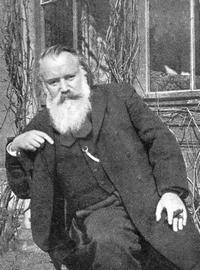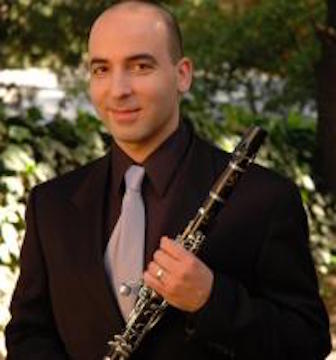The Well-Tempered Ear
Classical music: Today brings the release of an impressive CD of clarinet duos and trios with UW-Madison cellist Uri Vardi and his clarinetist son Amitai Vardi
3 Comments
By Jacob Stockinger
Today is when another outstanding recording by UW-Madison cellist Uri Vardi gets released by Delos Records.
The recording, which features clarinet trios by Ludwig van Beethoven and Johannes Brahms and clarinet-cello duos by contemporary composer Jan Radzynski, has all the makings of another winner.
For one, the repertoire is a fine mix of the late Classical style (Beethoven), the late Romantic style (Brahms) and modernistic nationalism (Radzynski).
It is, of course, a family affair, as you can read about here in a story about the premiere of the Concerto Duos by Radzynski:
http://news.wisc.edu/music-deepens-connection-for-father-son-performers/
The Ear also finds the playing first-rate and the sound engineering exemplary.
None of that should come as a surprise. You may recall that last year Vardi (below) and his colleague UW-Madison violin professor David Perry, along with pianist Paulina Zamora, released a recording of the three piano trios by Brahms. It was acclaimed by no less than Gramophone magazine. Here is a link to that review:
https://reader.exacteditions.com/issues/49269/page/3
The title of the new CD is Soulmates, and it seems fitting in so many ways that crisscross in many directions.
Here are notes from the educator and performer Uri Vardi:
“The title refers to friendship between composer and performer, as Jenny Kallick highlights in her liner notes.
“For his clarinet trio, Beethoven put to work the manners of a musical style that embraced the outward charm and lively sociability associated with the music of friends, interjecting his soon-to-be famous dramatic flashes only occasionally.
“Jan Radzynski (below) began his association with me in Israel, where the Vardi family from Hungary and Radzynski family from Poland first overlapped.
“Meeting once again during graduate studies at Yale School of Music, our friendship has been enriched by Jan’s project as an esteemed composer with multiple cultural ties to Poland, Israel, the US and Jewish tradition, and by my commitment as celebrated teacher and performer to collaborations across musical boundaries. Jointly, we have found ways to embrace the complexities of their origins and diaspora.
“The duo’s dedication to the entire Vardi family signals this deep connection.
“Nearly a century had passed before Brahms (below top) wrote for this same combination. Had it not been for his newly-blossomed musical friendship with clarinetist Richard Mühlfeld (below bottom, 1856-1907), a star performer in the Hofkapelle Orchestra at Saxe-Meiningen, the composer might have held to his recently announced plans to retire.
“On a more personal level, I admire composer Jan Radzynski’s music. I was moved by his gift to my son Amitai (below) — who teaches clarinet at Kent State University in Ohio — and me, and the rest of our family, of the Concert Duos. He presented the work to us in 2004, and we premiered it that same year.
“Brahms is the composer who influences me on the deepest level. Following the release of my previous CD by Delos, I was eager to record the fourth Brahms trio involving the cello, and was looking for an opportunity to add it to the other three trios.
“It is the greatest joy for me to play chamber music with my son. I was happy that both he, and my colleague and friend, pianist Arnon Erez (below), were ready to embark with me on the journey of performing and recording the three compositions on this CD.
“The UW Arts Institute awarded me the Emily Mead Baldwin Award, which helped me financially in releasing this CD. The recordings were done at the Jerusalem Music Center in Israel (which gave us their wonderful facilities free of charge).
“Sound engineer Victor Fonarov, who recorded this CD and started editing it, passed away before the completion of the work. So we decided to dedicate the album to his memory.
“Here is a promotional video, with a SoundCloud clip of the Beethoven work, for the recording:
https://delosmusic.com/recording/soulmates-cello-clarinet-piano/
“And you can hear an excerpt from Radzynski’s Duos in the YouTube video at the bottom.
“Interested readers can also purchase the album directly from Uri Vardi at: uvardi@wisc.edu”
Tags: Amitai Vardi, Arnon Erez, Arts, Beethoven, Cello, Chamber music, clarinet, clarinet trio, Classical, Classical music, Compact Disc, composer, Composition, David Perry, Delos records, diaspora, duos, Education, educator, friend, friendship, Gramophone, Hungary, Israel, Jacob Stockinger, Jan Radzynski, Jenny Kallick, Jerusalem, Jewish, Johannes Brahms, Kent State University, Ludwig van Beethoven, Madison, modern, modernistic, nationalism, nationalist, notes, Ohio, Paulina Zamora, performer, Piano, Poland, repertoire, Richard Mühlfeld, Romantic, SoundCloud, Teacher, tradition, trio, U.S., United States, University of Wisconsin-Madison School of Music, University of Wisconsin–Madison, Uri Vardi, US, Violin, Wisconsin, Yale School of Music, Yale University, YouTube
Classical music: Critic John W. Barker says The Ancora String Quartet opens its new season with a joyous and revelatory exploration of string trios with winds.
1 Comment
By Jacob Stockinger
Here is a special posting, a review written by frequent guest critic and writer for this blog, John W. Barker, who also took the concert photos. Barker (below) is an emeritus professor of Medieval history at the University of Wisconsin-Madison. He also is a well-known classical music critic who writes for Isthmus and the American Record Guide, and who hosts an early music show every other Sunday morning on WORT 88.9 FM. He serves on the Board of Advisors for the Madison Early Music Festival and frequently gives pre-concert lectures in Madison.
By John W. Barker
The Ancora String Quartet (below) opened its 2013-14 season with a concert Friday night at St. Andrew’s Episcopal Church on Regent Street.
Not only was the venue unusual for the group, but so too was its configuration. First violinist Leanne League has chosen to take a leave of absence from the group this season, reducing the ensemble to a trio — Robin Ryan, violin, Marika Fischer Hoyt, viola, and Benjamin Whitcomb, cello.
And so, a necessity became an opportunity, Whitcomb recruited some of his fellow faculty colleagues at the University of Wisconsin-Whitewater to help the Ancora players design of program of what we might call the string trio-plus-one.
As demonstrated in the concert, the trio-plus-one could represent a lot of literature. The most common plus-one has been the piano — in a genre developed in the late 18th-century and continuing virtually to the present, yielding a magnificent literature of “piano quartets” in their own terms.
But the plus-one with the string trio (below) could be other instruments, notably winds, and a considerable literature for such combinations was developed at the same time, though its popularity diminished through the 19th-century.
Thus, this program offered three “quartets” in which the added instrument was, successively a clarinet, a flute and a bassoon.
Given the comparatively stronger projection of each of these instruments, the texture tended to become that of a kind of concerto, with the three string instruments turning into a kind of mini-orchestra in support of the prominent “soloistic” writing for the plus-one.
Works of this kind were not concert pieces, in our terms, but were written and published in considerable quantities, for use in cultivated household parlors or elite salons. They were played by musicians who ranged from skilled amateurs to accomplished professionals. The works were not idle fluff, either, but ones carefully crafted and often posing considerable technical challenges.
That was clear in the opening work, one of particular substance, a Quartet in C major for Clarinet and Strings by Heinrich Baermann (1784-1847). Baermann (below) was perhaps the most admired and influential clarinet virtuoso between Mozart’s buddy, Anton Stadler, and the admired friend of Brahms, Richard Mühlfeld. Baermann was a friend of Carl Maria von Weber, who wrote concertos and chamber music for him, much influenced by the player’s style and skills.
The writing for the clarinet here is full equally of virtuosic and lyric demands, which were met beautifully by clarinetist Christian Ellenwood.
Ignaz Pleyel (1757-1831, below top) was a student of Franz Joseph Haydn, and for a while his rival. His name is forever linked with the makers of fine pianos, which members of his family became, while he was also active as a music publisher.
Pleyel wrote large amounts of chamber music, and his Quartet in A major for Flute and Strings is a piece of charm and vivacity. Flutist Robin Fellows (below bottom) was the deft soloist in this.
Franz Danzi (1763-1826, below), an almost exact contemporary of Beethoven, was a prolific composer in just about every form and idiom, though he is particularly remembered as one of the pioneering composers of wind quintets.
But Danzi enjoyed selective advancing of individual wind instruments, as exemplified in the final item on the program, his Quartet in B-flat major for Bassoon and Strings. (The first movement is in a YouTube video at the bottom.) This was the only four-movement work on the menu, one full of good tunes and amiable spirit. Its bubbling humor was brought out by Carol Rosing (below), but the writing for the violin also gave Robin Ryan chances to show off as a friendly partner/competitor.
This entire program, attended by over 100 people, was an absolute joy to hear, and surely a revelation to many about how much unjustly neglected music there is for this “quartet” of string trio-plus-one.
The season ahead offers a wonderful chance for the Ancora players to explore such literature further.
Tags: American Record Guide, Ancora String Quartet, Bassoon, Carl Maria von Weber, Chamber music, clarinet, flute, Franz Danzi, Heinrich Baermann, Ignaz Pleyel, Jacob Stockinger, Piano, Piano Quartet, Quartet, Regent Street, Richard Mühlfeld, string trio, University of Wisconsin–Madison















